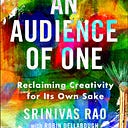The Dangers of Extrapolation, Self Help And Sensationalism
We live in a culture that is driven by self help books, blogs, podcasts and more. And I’ve contributed to some of this as well with my own work. But as consumers and creators, we have to be wary of extrapolation.
Too often, the work of authors, internet celebrities, and those exceptional few that are cultural icons is treated as gospel instead of guidance, a map, instead of a compass. We adopt blueprints, formulas, and mindsets, assuming that what worked for someone we look up to will work for us. In a conversation with my mentor Greg Hartle, he said “we confuse probability with possibility.”
Everyday my flipboard is filled with sensationalized headlines.
- 8 habits of people who made a fortune
- What Oprah Does that You should Do
- Think like Steve Jobs, Mark Zuckeberg, Elon Musk… icon of your choice
Nearly every major web site that people read on a daily basis has advice like this. I host a show where I interview people from all walks of life, who have achieved a degree of success in their given field. Some have published books, others have amassed fortunes, and some have robbed banks and lived to tell about it. But I’m reluctant to ever steer them in a direction where they tell anyone exactly what to do to change their life. They’re models of possibility, not probability. I’d never follow any of their advice to the letter.
David Heinemeir Hansson cofounder of base camp, said to me in an interview that the irony of writing a business book about the principles that have made him successful was not lost on him, given that their business practices were about not doing what is packaged as up generalized advice in other business books. He said that if we apply the principles that are use to run a massive organization like Google, to a company of five, we might do more harm than good.
But our cultural tendency is to extrapolate, and let people define our actions rather than inform them. The challenge with extrapolation is that there’s one critical variable that completely throws off every single formula for success, YOU or YOUR COMPANY. We’re not all created equal, which is a harsh reality for us to confront.
Even if I had spent 8 hours a day on the basketball court from the time I was in 8th grade, I’d likely never be able to play a game of horse with Lebron James and win, let alone go head to head with him.
When I was in college, the extrapolation occurred in the form of pedigree. I was a Berkeley undergrad and nearly every one of my friends didn’t just become investment bankers and consultants. They worked at Mickinsey and Bain. They didn’t just go to law school business school and medical school. They went to Harvard, Yale, Stanford, and MIT. This road to success only led me to a lot of dead ends.
Note: I didn’t get into any of those prestigious graduate schools
It was an interesting lesson we learned as we were building The Unmistakable Creative web site. We were thinking about what goes on an about page and started reading blog posts, and advice about how to do this. We almost became a victim of extrapolation. It was only after letting go of our tendency to extrapolate that we came up with something that wasn’t in any blog post. This is our about page.
Extrapolation when taken too far kills our creativity and sets us up for disappointment. It also draws us into the seductive and profitable lure of a mimicry epidemic. We have to understand that there’s a profound difference between letting what we read inform our actions and defining them.
H/T Greg Hartle for an incredibly thought provoking conversation that will air next week on Unmistakable Creative.
I’m the host of The Unmistakable Creative Podcast. Subscribe to the podcast viaiTunes or Stitcher.
